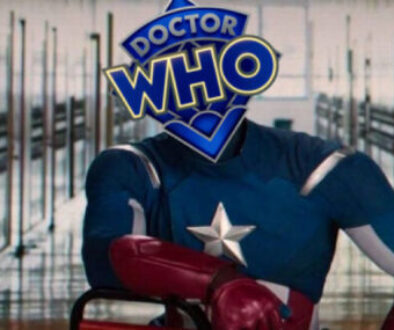5 Reasons To Rejoice At Toby Whithouse’s Return
Connor Johnston celebrates the return of Toby Whithouse for Series 9

And so the excitement begins! Finally after just over a week of filming the new series, the second major piece of news has emerged from BBC regarding the writing line up for next series – and to say said news has left me ecstatic is without a doubt one of the greatest understatements known to man. Joining Steven Moffat and Catherine Tregenna in the Series 9 line up is Whoniverse veteran Toby Whithouse, who in his career has penned 4 episodes of Doctor Who and one episode of Torchwood since making his debut for the show in David Tennant’s second series. Today, join me in listing 5 reasons Whithouse’s return should be met with rejoice and predict what we can look forward too from the writer in his Series 9 two-parter.
5. Character Focus
 If there is one writer in my mind that without fail has always delivered overwhelming justice to every character he writes, Whithouse would undoubtedly be my first choice. “School Reunion” saw the return of one of the greatest characters the show has ever known in the form of Sarah Jane Smith, and luckily for her character it was an episode that in essence was seamlessly designed to highlight all that so memorable and touching about her.
If there is one writer in my mind that without fail has always delivered overwhelming justice to every character he writes, Whithouse would undoubtedly be my first choice. “School Reunion” saw the return of one of the greatest characters the show has ever known in the form of Sarah Jane Smith, and luckily for her character it was an episode that in essence was seamlessly designed to highlight all that so memorable and touching about her.
In what can only be described as the perfect re-integration episode for such an amazing character, the plot culminates in Sarah Jane once again saving the Doctor from temptation and speaking the words that both summarised the themes of the entire episode, but also her entire character’s story and have been used constantly in remembrance and tribute to her legacy ever since Elizabeth Sladen’s unfortunate passing almost 4 years ago:
Pain and loss, they define us as much as happiness or love. Whether it’s a world, or a relationship… Everything has its time. And everything ends.
“Vampires of Venice” also saw incredible justice directed in the way of Rory’s character and by extension his relationship with Amy when he was first reintroduced halfway through Series 5. The beginning of the episode indicates anything but smooth sailing for the pair, but through a plot that involves Amy becoming endangered and Rory confronting the Doctor regarding the fact that he makes people a danger to themselves, we get a clear indication of how much love and concern Rory has for Amy completely unconditionally. It remains, in my humble opinion, one of Arthur Darvill’s best performances.
It’s also a character defining piece for Rory proving that, regardless of initial judgements by the audience, he was not going to a character that the Doctor could easily trample over and someone that wasn’t afraid to stand up and call the Doctor out on his actions. Perhaps the fact that Whithouse’s stories seem to be, for the most part, character-driven is the reasoning as to why has written more for the show during Steven Moffat’s era than RTD’s; though one thing we can be certain of is that with character focus being so instrumental to the show at the moment, Whithouse’s placement in Series 9 just feels so perfectly appropriate.
4. Handling Mature Themes
 There’s no doubt that the tone of Doctor Who as it is now has incredibly been adjusted to perfectly balance darker and more mature themes in its storytelling while still offering enough light-hearted moments to cater for members of the audiences looking for lighter viewing. One of the major reasons Whithouse seems like a perfect fit for Series 9 is that I’ve always felt his stories have too achieved this perfect balance and integration of darker tones to the show. With his addition to the series this year being billed as a “creepy 2 parter” there’s no doubt of us being treated to the darker corners of the writer’s imagination.
There’s no doubt that the tone of Doctor Who as it is now has incredibly been adjusted to perfectly balance darker and more mature themes in its storytelling while still offering enough light-hearted moments to cater for members of the audiences looking for lighter viewing. One of the major reasons Whithouse seems like a perfect fit for Series 9 is that I’ve always felt his stories have too achieved this perfect balance and integration of darker tones to the show. With his addition to the series this year being billed as a “creepy 2 parter” there’s no doubt of us being treated to the darker corners of the writer’s imagination.
Arguably his most controversial, and in my mind, most mature of Whithouse’s Whoniverse credits is his Torchwood episode, “Greeks Bearing Gifts”. The episode focused on the torture and torment that the realisation of true honesty regarding people’s innermost desires, regrets and darkest thoughts entails when Toshiko is given a pendant that allows her to hear the thoughts of everyone around her and consequentially forces her to question her commitment to the Torchwood team.
“The God Complex” was an episode again shrouded in darkness and mature themes by focusing on a monster that used people’s fears to strip them and feed off their faith and beliefs. Whithouse has constantly shown how he can tackle the most mature, frightening and horrific of themes and ideas with plots that are not only as dark as the issues they presented, but also deals with them so extremely tastefully, by not cheapening or underestimating the seriousness that should be always associated when addressing them.
3. Pacing
 Pacing is an issue that always seems to linger around Doctor Who and the sometimes unfortunate nature of the show’s 45-minute(ish) running time. While personally it’s never overwhelmingly effected my viewing of each episode, there are of course occasional instances where pacing issues are both evident and detrimental to a stories quality and reception. When it comes to Toby Whithouse however, I feel like he is one of the few writers that have a perfect streak when it comes to the pacing of stories and in writing episodes that feel like they go for almost double the time of others. Specifically, “A Town Called Mercy” is the perfect example of how Whithouse’s depth in writing and creation of various layers to his plots effect the pacing of his episodes for the better.
Pacing is an issue that always seems to linger around Doctor Who and the sometimes unfortunate nature of the show’s 45-minute(ish) running time. While personally it’s never overwhelmingly effected my viewing of each episode, there are of course occasional instances where pacing issues are both evident and detrimental to a stories quality and reception. When it comes to Toby Whithouse however, I feel like he is one of the few writers that have a perfect streak when it comes to the pacing of stories and in writing episodes that feel like they go for almost double the time of others. Specifically, “A Town Called Mercy” is the perfect example of how Whithouse’s depth in writing and creation of various layers to his plots effect the pacing of his episodes for the better.
Lord don’t I know the opposition this next comment will breed – however it’s without regret I admit “A Town Called Mercy” is easily one of my favourite episodes of the show’s history – and a contributing factor to the high esteem I hold the episode in is the fact it feels like there is so much weight to the episode and so much that can be taken away from it that it almost extends the usual duration of a Doctor Who epiosde. Throughout the length of the story (as with much of Whithouse’s work) there are various layers of storytelling: The thematic layers of the consequences of the Doctor’s mercy, Kahler Jex’s guilt and the Pond’s relationship with the Doctor marry perfectly to the narrative layers of the Gunslinger’s true motivations and his hunt for Kahler Jex. This produces an episode so rich in moral ambiguity, character development and plot twists that the issue of pacing is all but existent.
2. Villains and Monsters
 Each of Whithouse’s episodes have come attached with the invention and execution of brand new; extraordinarily sinister, genuinely evil and unnervingly memorable threats that have each respectfully embedded themselves into the darkest categories of Whoniverse villains imaginable. “School Reunion” saw birth of the Krillitanes, creatures with control over their own evolution, headed by the sinister Mr Finch – an alien race whose premise has constantly been labelled a stroke of genius by fans that without rest call for their return.
Each of Whithouse’s episodes have come attached with the invention and execution of brand new; extraordinarily sinister, genuinely evil and unnervingly memorable threats that have each respectfully embedded themselves into the darkest categories of Whoniverse villains imaginable. “School Reunion” saw birth of the Krillitanes, creatures with control over their own evolution, headed by the sinister Mr Finch – an alien race whose premise has constantly been labelled a stroke of genius by fans that without rest call for their return.
“Vampires in Venice” was yet another classic example of the Whoification of a classic monster when integrating the legend of the vampire into an episode with the invention of the Saturnyns – a species I feel are one of the most underrated Doctor Who monsters to date. Much like the Krillitanes, the Saturnyns were headed by a menacing leader disguised as a human being – this time Rosanna Calvierri whose threatening presence was substantiated by her motivations to completely destroy an entire city to ensure the survival and breeding of her own species and was determined nothing would stand in her way.
Finally, “The God Complex” and “A Town Called Mercy” both dealt with killers whose presence and realisation made them each one of the most terrifying and threatening enemies of their respective series, but whose final reveals held so much more depth than expected to their premises. Such an ominous track record with villains and monsters leaves me in no doubt that Whithouse’s “creepy 2-parter” this series will deliver successfully on both the scare and menacing factors so crucial to his episodes.
1. Dissecting the Doctor
 Toby Whithouse’s scripts have always had such an amazing weight through their commentaries on the Doctor’s innermost character – and for me it’s the ultimate reasoning to rejoice in the news of his return. The question regarding the Doctor’s choice to take on companions was a very prominent theme towards the end of both the 10th and 11th Doctor’s eras, but specifically was tackled quite powerfully in two of Whithouse’s scripts, Series 6’s “The God Complex” and Series 5’s “The Vampires of Venice”.
Toby Whithouse’s scripts have always had such an amazing weight through their commentaries on the Doctor’s innermost character – and for me it’s the ultimate reasoning to rejoice in the news of his return. The question regarding the Doctor’s choice to take on companions was a very prominent theme towards the end of both the 10th and 11th Doctor’s eras, but specifically was tackled quite powerfully in two of Whithouse’s scripts, Series 6’s “The God Complex” and Series 5’s “The Vampires of Venice”.
Everybody knows that everybody dies, and no one knows it as much as the Doctor. He has watched over and over again his friends, companions and people he has cared the most for suffer and/or die due to travelling with him. While any companion will most probably say that the pros of travelling with the Doctor far outweigh the cons, the Doctor knows more than anyone the eventual price each of his friends will have to pay. Knowing the danger that a life in the TARDIS creates, why would a good man ever voluntarily allow people to put themselves in those dangerous positions?
Besides from introducing his companions to the danger, he impresses them and almost makes them want to embrace this danger to impress him in return. The undeniable truth is that the Doctor allows this to happen because of his never-ending loneliness and his constant yearning for companionship. Yes it’s a heartbreaking motivation and yes it’s a sweet one from our point of view, but it’s also incredibly selfish and incredibly questionable from his.
Whithouse’s most recent episode, “A Town Called Mercy” was also instrumental in exploring the darker corners of the Doctor’s thoughts once again. How detrimental is the Doctor’s ability to show mercy in the long run? How much pain and suffering has the Doctor’s mercy allowed to happen? Through the plots of Rory confronting the Doctor in “Vampires of Venice”, the Doctor himself breaking Amy’s belief in her imaginary friend in “The God Complex” and the examination of the effects of the Doctor’s actions in “A Town Called Mercy”, Whithouse has proven constantly that both his interest and amazing ability to make commentary of the Doctor’s conscience is one of his greatest strengths as a writer.
Of course, no writer is without their discrepancies – however I believe that these specific 5 reasons (as well as countless more there simply isn’t room to list) are proof Whithouse’s values very much outweighs his faults and why I personally am extremely pleased with the news of a Whithouse-2-parter gracing our screens this year. 3/10 Writers on my Series 9 Wish list have made it through, and it’s with great anticipation I await further announcements!
Are you too rejoicing in Toby’s return? Let us know in the comments below.








